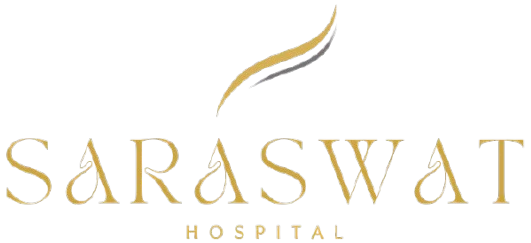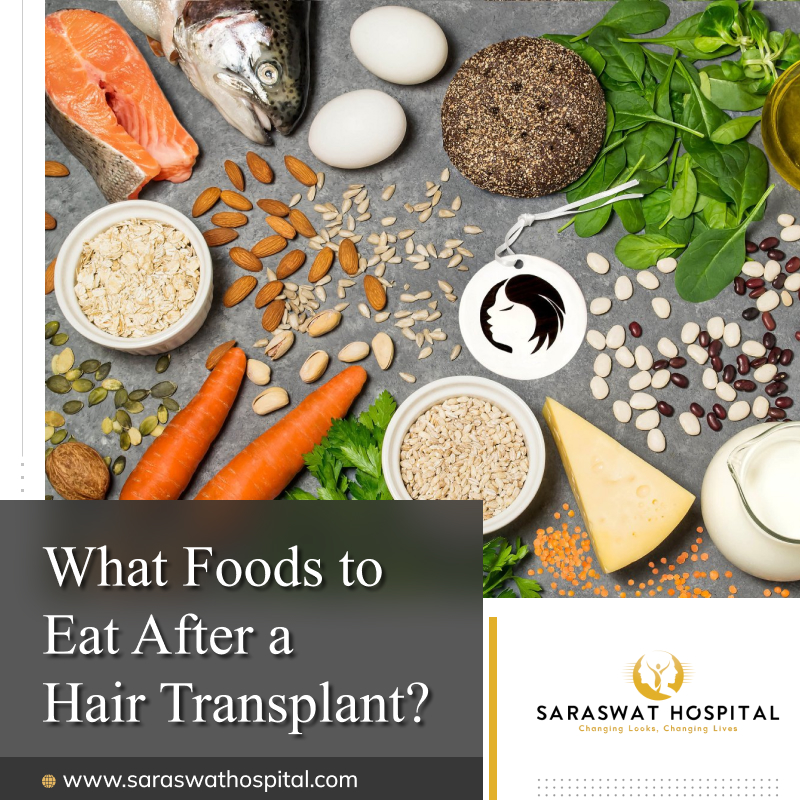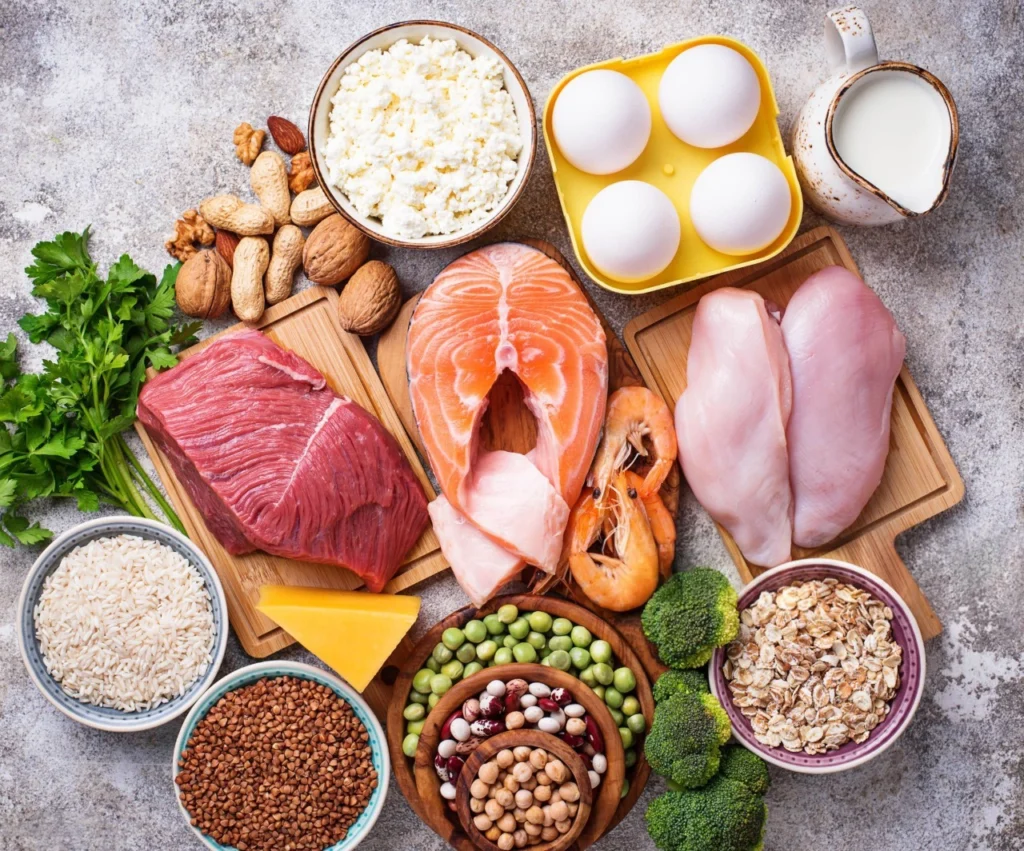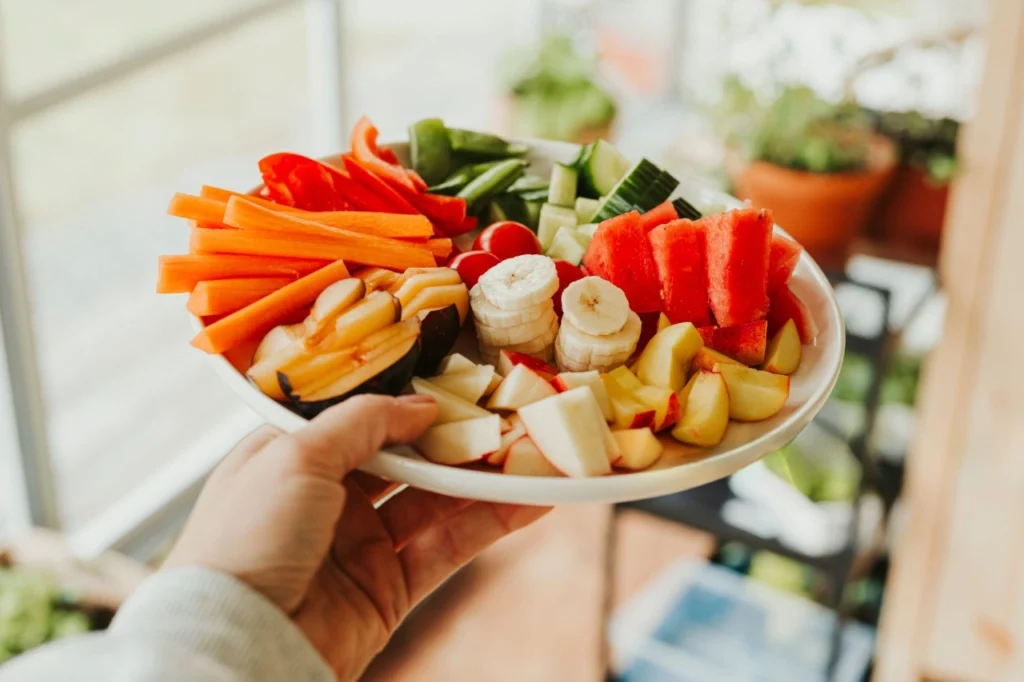With hair loss becoming a major problem for both men and women, hair transplant procedures have become fairly common among many people. Undergoing a hair transplant surgery gives you permanent and natural-looking hair restoration results. But to get the best result, you need to have the best diet after a hair transplant.
Whether you get your hair transplant in Agra at Saraswat Hospital or in some other city at another clinic, it is important to follow the after-care instructions precisely for positive results. Hair transplant is a surgical procedure, and the body needs optimum rest and proper nutrition for a fast and safe recovery. Hair loss can often be attributed to a poor and imbalanced diet. After a hair transplant, when the patient is trying to speed up their hair growth phase, it is important to have rich and nutritious foods. Below, we look at some essential nutrients and vitamins that a patient must intake after a hair transplant surgery.
Best Diet After a Hair Transplant
The best diet after a hair transplant should be rich in protein, vitamin A, zinc, iron, antioxidants, and essential minerals to support healing and promote healthy hair growth. Protein helps repair tissues and strengthens hair follicles, while vitamin A supports cell regeneration. Zinc and iron improve blood circulation and deliver oxygen to the scalp, boosting follicle health. Antioxidants from fruits and vegetables protect the scalp from free radical damage, ensuring better recovery. A balanced, nutrient-dense diet is key to achieving long-lasting and natural-looking results.
-
Zinc
Zinc is essential to maintain healthy hair. It boosts the collagen production in our body, which helps with cell regeneration and tissue repair after the surgery. Zinc also helps to balance the hormone levels and to absorb important vitamins and minerals. To add zinc to your diet, consume foods such as cashews, nuts, oysters, seafood, and whole grains.
-
Iron
Iron increases the oxygen flow in your bloodstream and strengthens your body’s immune system. It also helps improve the hair texture on your scalp. The increased blood flow ensures that all vitamins and nutrients reach your hair roots effectively. Consuming iron-rich foods is good for hair growth. Add more spinach, beans, leafy vegetables, seafood, and red meat to your diet.
-
Vitamin B-Complex
B-Complex vitamins such as B12 and Biotin (B7) play a key role in hair growth and in building a strong hair structure. It is essential for wound healing after the hair transplant surgery as it helps with the blood clotting process. Food that contains B-Complex vitamins includes bananas, avocados, nuts, eggs, chicken, etc.
-
Vitamin D
Studies have shown that people with Vitamin D deficiency are more susceptible to getting alopecia. Hair follicles can be sensitive to hormonal changes in the body, and taking Vitamin D supplements helps to balance any hormonal changes. It also helps to activate hair growth cells. Foods that are rich in Vitamin D are fish, red meat, liver oil, salmon, egg yolks, and more.
-
Vitamin A
Vitamin A helps with cell growth. It is also responsible for producing sebum by your hair follicles, which keeps your scalp naturally oily. Hair transplant patients must consume foods that are rich in Vitamin A to prevent a dry scalp that can cause itchiness. This includes carrots, spinach, kale, sweet potato, pumpkin, winter squash, and more.
-
Vitamin E
Vitamin E is an antioxidant, which means it helps with skin repair and tissue damage. It is essential for hair transplant patients as they help in healing the skin on the scalp and also prevent scarring. It helps to rebuild damaged hair follicles. Vitamin E-rich foods include almonds, avocado, spinach, sunflower seeds, olive oil, and more.
-
Protein
Proteins are the building blocks of your hair and scalp tissues. A protein-rich diet helps with faster healing after the surgery and also increases hair growth for your transplanted follicles. Foods that have high amounts of protein are pulses, walnuts, eggs, fish, and chicken.
Foods to Avoid After a Hair Transplant
- Sugary Foods & Desserts – Excess sugar can cause inflammation, slow healing, and negatively impact hair follicle health.
- Processed & Junk Foods – Packaged snacks, fast food, and frozen meals are high in unhealthy fats and preservatives, which may hinder recovery.
- Spicy Foods – Spices can increase sweating, which may irritate the scalp and delay scab healing.
- Oily & Fried Foods – Deep-fried foods can increase sebum production, making the scalp oily and prone to infection.
- Processed Meats – Sausages, salami, bacon, and deli meats contain preservatives and unhealthy fats that may slow recovery.
- Alcohol – Alcohol can thin the blood and interfere with proper healing during the first few days after surgery.
- Caffeine (in excess) – Too much caffeine can dehydrate the body and affect blood circulation, slowing recovery.
Low-Quality Dairy Products – Processed cheese or ice creams with additives can trigger inflammation
Conclusion
Hair transplant procedure may be quick and pain less, but the patient still needs to follow a proper diet after a hair transplant. Saraswat Hospital in Agra has one of the best hair transplant success rate in India because their medical team provides excellent after-care to the patient even after surgery. They have regular appointments with the patient to monitor their progress.
If you want credible surgeons to do your hair transplant surgery and are looking for reputed clinics in and around Agra, then we suggest getting a hair transplant in Agra at Saraswat Hospital.
FAQs
1. What foods should I eat after a hair transplant?
After a hair transplant, focus on a balanced diet rich in protein, vitamins, and minerals. Include foods like eggs, fish, nuts, leafy greens, whole grains, and fruits. These nutrients promote faster healing and support healthy hair growth.
2. Are there any foods I should avoid after a hair transplant?
Yes, avoid junk food, processed snacks, sugary items, and oily or spicy foods as they may cause inflammation or slow the healing process. Also, limit alcohol and caffeine consumption for the first few days after surgery, as they may affect blood flow and recovery.
3. How important is protein in my post-hair transplant diet?
Protein is very important because hair is made of keratin, a type of protein. Eating protein-rich foods like chicken, eggs, beans, lentils, and tofu helps strengthen new hair follicles and improve hair growth results.
4. Do I need to take supplements after a hair transplant?
Supplements like biotin, zinc, and vitamin D may help improve hair health if you are deficient. However, consult your doctor before taking any supplements to ensure they are safe and suitable for your condition.
5. Can drinking water help in my recovery after a hair transplant?
Yes, staying hydrated is crucial after a hair transplant. Drinking enough water supports proper blood circulation, speeds up healing, and helps deliver essential nutrients to the transplanted follicles.
6. Can I eat spicy foods after a hair transplant?
It’s best to avoid spicy foods for at least the first few days after your hair transplant. Spicy food can increase sweating, which may irritate your scalp and delay scab healing.




